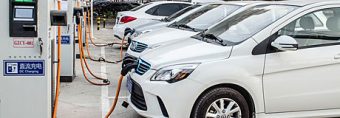 Traffic in China’s cities is steadily increasing. GIZ is advising the country on how to mitigate greenhouse gas emissions and make the transport sector more climate friendly.
Traffic in China’s cities is steadily increasing. GIZ is advising the country on how to mitigate greenhouse gas emissions and make the transport sector more climate friendly.
Climate change mitigation is a major challenge for China’s cities – particularly as automobile transport is increasing rapidly. 144 million cars have already been registered by 2016. The result: air pollution, greenhouse gas emissions, traffic congestion and land use are all increasing.
Working on behalf of the German Federal Ministry for the Environment, Nature Conservation, Building and Nuclear Safety (BMUB), the Deutsche Gesellschaft für Internationale Zusammenarbeit (GIZ) GmbH is supporting China in the low-carbon transformation of its transport sector. One priority is electro mobility. The key question is: What measures must be implemented so that electro mobility also helps mitigate climate change? To address this, GIZ is analysing vehicle emissions – from electricity generation to vehicle use through to recycling. Since electro mobility cannot resolve traffic congestion by itself, other measures such as car sharing and carpooling can play a role in helping protect the environment and reduce greenhouse gas emissions. For example, at the beginning of 2016 a German provider introduced a car sharing model, which is well-known in Germany, to the Chinese city of Chongqing with its 30 million inhabitants – and other cities are due to follow suit.
China’s cities are also undertaking short-term measures to address their climate impact. GIZ is supporting them with a tool for measuring emissions. The emissions model, originally designed for Europe, has been adapted to the Chinese transport sector and has already been applied by six large cities in their transportation decision-making processes. For example, Beijing used the model to test which type of toll system makes the most sense for reducing CO2 emissions. The city of Shenzhen is monitoring when and how the most carbon dioxide emissions are released per minute and by street. Another measure being used to mitigate greenhouse gases is a digital parking space management system and a smart phone app developed by GIZ together with the China Automotive Technology and Research Centre (CATARC) in Shenzhen. Drivers can use the app to find and reserve empty parking spaces, thereby avoiding congestion and unnecessary driving. This improved parking space management system will mitigate two million tonnes of CO2 between 2015 and 2020.
Source: giz.de

